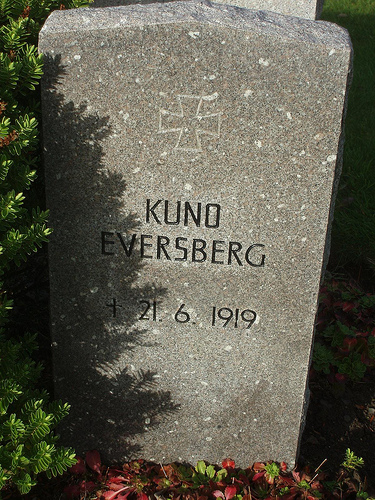Last Casualty of the Great War? April 22, 2014
Author: Beach Combing | in : Contemporary , trackbackThe last death in the Great War took place, as is often the case with such conflagarations, long after most of those involved had put down their weapons. 21 June 1919, the German High Fleet had illegally scuttled itself at Scapa Flow in Orkney, the island group to the north of Britain. The aftermath was chaotic and sometimes bloody as British soldiers, many would say without need, shot at German sailors evacuating their sinking vessels. Nine Germans died on that day, among the last casualties of the conflict that had begun in 1914, but Kuno Eversberg was not one of them: the date on the gravestone is incorrect! Kuno was dragged ashore and placed as a prisoner on HMS Resolution. 23 June though a British able seaman, James Wooley shot, with a rifle, into a group of German soldiers and KE, a man he had presumably no prior relations with, was injured in the back, dying afterwards. JW was drunk at the time (there had been peace celebrations) and was said to have claimed that this was an act of revenge for the loss of two brothers in the war.
If that is a pitiful enough way for the last man to die in the ‘long’ Great War, then the sequel was contemptible. 30 Jan 1920 JW was remanded for murder in Edinburgh. The trial concluded 9 February 1920 with a jury spending thirty minutes to decide unanimously that the case was unproven: a mid position between guilt and innocence in Scottish law. Thirty minutes is a very short period for consulation in the Scottish legal system and the suspicion is that this was the ‘price paid by the Hun’ for his enmity. The newspaper reports ends by stating: ‘There was considerable applause in court, and accused was heartily congratulated by his naval friends.’ As to poor old Kuno Eversberg: he had made it through the war; he had made it through the peace, as 20,000 German sailors were reduced to 2,000 at Scapa; then, finally, he had made it through the scuttling only to be murdered or man-slaughtered because he was unlucky enough to be in a next door room while peace was breaking out. He rests today in Lyness Royal Navy Cemetery in Orkney with a group of other Germans: peace on his soul.
In writing this I’ve claimed that KE’s is the last death from the Great War, while waiting, of course, to be contradicted. The last death in the long Second World War, at least the last that I’ve found, dates to the 1980s… drbeachcombing AT yahoo DOT com



